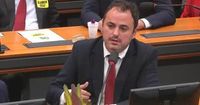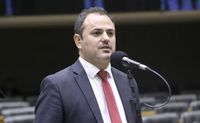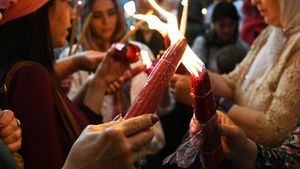On Thursday, April 17, 2025, federal deputy Glauber Braga (PSOL-RJ) announced the end of his hunger strike, which had lasted over a week. The hunger strike was a form of protest against the process seeking to revoke his parliamentary mandate, which was approved by the Ethics Council of the Chamber of Deputies the previous week.
The decision to suspend the hunger strike came after an agreement was reached during a meeting with the Speaker of the House, Hugo Motta (Republicanos-PB). Throughout the strike, which lasted eight days, Braga reportedly lost nearly five kilograms, subsisting only on serum, isotonic drinks, and water.
Braga emphasized his commitment to continue fighting for his ideas and his mandate, stating, “I am suspending the hunger strike I announced nine days ago. This suspension—after dialoguing with movements and having a lengthy meeting—comes after a commitment made by the Speaker of the House.”
In attendance at the meeting were several prominent figures, including Minister of Racial Equality Anielle Franco, PT and PSOL leaders Lindbergh Farias (RJ) and Talíria Petrone (RJ), and Braga's wife, Deputy Sâmia Bonfim (PSOL-SP). During the meeting, Motta assured that following the deliberation of Braga's appeal in the Constitution and Justice Committee (CCJ), the case would not be brought to the plenary for at least 60 days, allowing Braga time to prepare his defense.
“After this period, the deputies will be able to decide sovereignly on the process,” Motta stated in a post on X (formerly Twitter). This time frame means that the revocation vote will not occur until the second semester, after the parliamentary recess.
Braga's protest stems from accusations of parliamentary misconduct, which include kicking a member of the right-wing Movimento Brasil Livre (MBL) during a confrontation in 2024 and making offensive remarks against former Speaker of the House Arthur Lira (PP-AL). Braga contends that his actions were a reaction to the militant's offensive remarks about his deceased mother, who passed away a week after the incident.
As he prepares his appeal, which must be filed by Tuesday, April 22, 2025, Braga is adamant that the push for his revocation is not solely based on his actions against the MBL demonstrator but rather linked to his vocal opposition to the so-called secret budget. He claims that this process is part of a political maneuver orchestrated by Lira.
“The suspension of the hunger strike comes from a message that showed a retreat, an important signal against the persecution that was operating here,” Braga explained. “We are suspending the hunger strike, but we are not suspending the fight against the secret budget, against oligarchic power, nor are we suspending the struggle for accountability for the murderers of Marielle, or against the coup plotters at hand.”
Deputy Sâmia Bonfim confirmed that the appeal to the CCJ is ready and will be submitted on the specified date. Additionally, the PSOL bench plans to meet with CCJ President Paulo Azi (União-BA) on the same day. A group of jurists and religious leaders is also expected to engage in discussions with Azi and Motta in the coming days.
Braga's situation has sparked considerable debate among political circles, with many viewing the events as emblematic of the ongoing tensions within Brazilian politics. The agreement reached between the deputies and the Speaker of the House reflects a significant moment in the legislative process, with implications for both the future of Braga's mandate and the broader political landscape.
As the political climate remains charged, the upcoming weeks will be crucial for Braga as he navigates the challenges ahead. With the potential for a vote on his mandate looming, the outcome could set a precedent for how similar cases are handled in the future.








